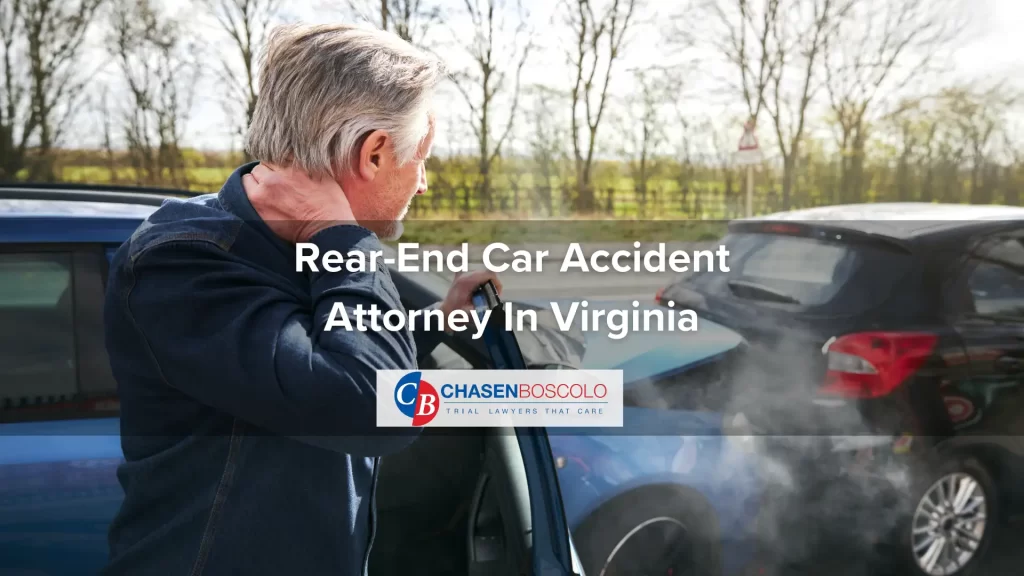
Rear-end crashes are the number one cause of vehicle accidents with injuries, according to data from the National Highway Traffic Safety Administration (NHTSA). More than 32% of accidents involving an injury were caused by this type of collision in 2017.
A rear-end accident occurs when one vehicle’s front bumper collides with the rear of another car. It’s the cause of thousands of injuries and fatalities every year in the U.S. Rear-end crashes occur during the busy summer months when tourists visit the beaches of Virginia and at intersections with stoplights and stop signs. Although they seem to happen when the roads are more congested, they can happen anywhere and anytime.
If you got hurt in a rear-end collision in Virginia, chances are, the person who hit you from behind is to blame. Even when the at-fault party is clear, however, the insurance companies will try to make the process as complicated and confusing as possible to get you to accept a low settlement. Insurance companies are for-profit companies, and they’ll do whatever it takes to minimize your compensation.
It’s crucial that you hire an experienced attorney to ensure your rights stay protected, and the insurance company treats you fairly. At CHASENBOSCOLO, we have helped thousands of car accident victims in the Virginia, Maryland, and Washington, D.C. areas since the firm was founded in 1986. We’re committed to helping our community members, and we’ll dedicate ourselves to your case.
To find out how our award-winning Virginia car accident lawyers can help you recover compensation for your injuries, contact CHASENBOSCOLO today at (703) 538-1138 and schedule a free consultation.
The Dangers of Tailgating
When someone follows a car ahead of them too closely, it leaves very little room for them to come to a complete stop, if necessary. According to the Virginia Department of Motor Vehicles, motorists should follow the two, three, and four-second rules when driving behind another car.
If you’re trying to determine how far you should remain behind someone, count the number of seconds it takes you to pass a fixed object after the vehicle ahead passes it. If you’re outside the recommended amount of seconds, you should slow down.
- 2 seconds if you’re traveling under 35 mph
- 3 seconds if you’re traveling between 35 and 45 mph
- 4 seconds if you’re traveling between 46 and 70 mph
The faster you’re driving, the more distance you’ll need to leave between you and the vehicle in front of you. If you have to slam on your brakes, it’ll take longer for your car to come to a complete stop. If you didn’t leave enough space ahead, you’ll likely crash into the rear of the other vehicle.
If you notice someone is tailgating you, there are certain things you can do to reduce your risk of a rear-end accident:
- Don’t brake-check the person behind you or engage in other “road rage” behaviors. Remain calm and respectful.
- Move over to the slow lane so they can pass you.
- Speed up to put more distance between you while maintaining a safe rate of speed.
- If you’re in the far-left lane and can’t make it to the slow lane, consider making a left turn to get away from the tailgater, if you believe you can do so safely.
Besides tailgating, other circumstances could lead to a rear-end car accident, such as:
- Speeding
- Distracted driving, such as texting or eating
- Drowsy or fatigued driving
- Slow-moving traffic
- Driver under the influence of drugs or alcohol
- Traffic congestion
- Road rage
What Should I Do If I Get Hurt in a Rear-End Accident?
 If you get rear-ended and sustain an injury, don’t panic or leave the scene. There are crucial steps you should follow to ensure your safety and also to secure your eligibility for financial compensation. These include:
If you get rear-ended and sustain an injury, don’t panic or leave the scene. There are crucial steps you should follow to ensure your safety and also to secure your eligibility for financial compensation. These include:
- Call 911 and wait for the police to show. They will perform an investigation into the crash and write a police report stating the cause. Request a copy of it when it becomes available.
- If you can move around, take pictures of the accident scene and vehicle damage.
- Exchange auto insurance information with the other motorist.
- Get the names and phone numbers of anyone who witnessed the accident, including other drivers and passengers involved in the collision.
- Drive yourself or get transported by an ambulance to the hospital for a medical examination of your injuries. Follow up with doctors they recommend.
- Take your car to a repair shop for an estimate.
- Keep copies of all records and documentation related to the accident and your injury.
- Hire a Virginia rear-end car accident lawyer from CHASENBOSCOLO.
Who’s Responsible for Paying Compensation?
Virginia follows a standard fault system, so the person at-fault for the rear-end crash becomes financially responsible. Typically, their liability auto insurance pays a settlement to the injured victim. CHASENBOSCOLO will help you file a claim and negotiate a fair settlement.
When you pursue compensation from the liable driver, you’re entitled to various compensatory damages. Compensatory damages are a monetary award that compensates an injured person for their expenses and intangible losses.
Economic damages are incurred expenses and cover things such as:
- Medical treatment
- Loss of income and lost earning capacity
- Car repairs
- Rental vehicle
- Prescription medicine copay
- Property damage
Non-economic damages are intangible losses that are more difficult to quantify and typically include:
- Emotional distress
- Loss of enjoyment of life
- Physical pain and suffering
- Disability
There’s a third type of damage known as punitive damages. They’re not available in an insurance claim settlement, but you can seek them in a lawsuit. If you choose to file a lawsuit against the at-fault driver, you have to follow a two-year statute of limitations. That’s the period you have from the accident date to sue.
When the victim of a rear-end collision files a lawsuit for punitive damages, it isn’t for reimbursement of their medical costs and other expenses. Typically, punitive damages are a form of punishment against the at-fault motorist, and its goal is to prevent similar recklessness from occurring in the future.
Many states don’t limit the number of punitive damages a jury can award the victim of an accident; however, Virginia law places a cap on punitive damages in personal injury cases. If you got hurt in a rear-end crash and want to pursue punitive damages, you won’t receive more than $350,000, even if the jury verdict contains a higher award. If that happens, the judge will reduce the final award, so it doesn’t exceed the limit.
Rear-End Car Accident FAQs
An attorney can help answer all of your questions about your accident and case, but we’ve compiled answers to a few commonly asked questions that might be helpful.
How much money can I expect from a rear-end accident claim?
There isn’t a specific number we can predict you’ll receive; however, there are some factors the insurance adjuster will consider when they’re reviewing your claim to determine the appropriate settlement amount. These include:
- Type and severity of your injury
- Duration of medically necessary treatment
- Calculation of lost wages
- Total damages incurred
- Insurance limits on the policy
- Evidence that proves the other driver’s negligence
- If the injury caused a disability or long-term impairment
- How the injury affects your quality of life
Is the rear driver always to blame for a rear-end crash?
No. Sometimes the driver in front is at fault for a rear-end accident. If you stopped for no apparent reason or did something that created a dangerous situation for the person behind you, an insurance company might find you to be partially responsible. However, most circumstances require the rear driver to follow far enough away that they can avoid a collision if the driver ahead needs to slow down or stop.
What happens if I’m partly at fault for a rear-end accident?
Virginia follows a pure contributory negligence rule. To qualify for financial compensation from the at-fault driver, they must be 100% responsible. If you share even a small amount of blame for the crash occurring, you won’t be eligible to collect monetary damages. A skilled attorney will fight to protect your right to compensation.
What if the other driver doesn’t have insurance?
Despite there being a legal requirement for drivers to carry auto insurance, there’s a chance the driver who rear-ended you might not have any. If that happens, you can file a claim with your insurance. UM (uninsured/underinsured motorist coverage) compensates accident victims for some damages if the at-fault driver doesn’t hold liability insurance or their limits aren’t high enough. You can file a UM claim for compensation of medical bills and lost wages.
Can I sue someone other than the driver for compensation?
Yes. There are certain circumstances where other parties besides the at-fault driver can be held liable for damages. For example, if the driver that rear-ended you was working at the time – as an Uber driver, for example – you can file a claim with the company’s liability insurance or file a lawsuit.
How much does it cost to hire a Virginia rear-end car accident lawyer?
CHASENBOSCOLO doesn’t charge any upfront fees or costs. When you hire us, we will take your case on contingency, which means we don’t collect a fee unless we secure a settlement or favorable jury verdict. If you don’t get paid, we don’t get paid.
Contact CHASENBOSCOLO for a Free Consultation
At CHASENBOSCOLO, we know you’re facing an uphill legal battle. You don’t have to go through this challenging time alone. We’ll take care of the legal aspects of your case so you can focus on recovering. We have the resources, experience, and knowledge to collect sufficient evidence and aggressively fight against opposing parties for the compensation you deserve.
We have over 30 years of experience helping rear-end accident victims win the monetary award they need to cover their damages and move forward. When you hire us, you can depend on our Virginia auto accident lawyers to be by your side throughout your case and work to meet your goals.
To find out more about our legal services and how we can help you in your rear-end accident claim, call (703) 538-1138, and we’ll meet you for a free initial consultation.





